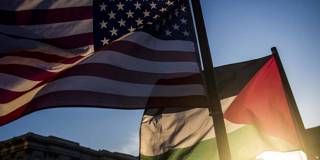Joe Biden promised to make democracy and human rights central to US foreign policy. But that means not insisting on Israel’s right to defend itself without mentioning its expansion of settlements in occupied Palestinian territory, its policy of discrimination, and its denial of the Palestinians’ right to an independent state.
VIENNA – For many generations of Arab youth, mine included, studying and working in the United States was a coveted opportunity to experience freedoms, possibilities, and the sense of egalitarianism that the American way of life embodied. It was a doubly enriching experience for those of us raised in authoritarian or conservative societies. It was thrilling to be able to think and act independently, without societal pressure. I was excited to take home some of the lessons I learned from a functioning democracy, not least the vital role of freedom of expression, the importance of civil society, and the exceptional benefits of empowering people.
Of course, I was also aware of the US system’s failings, and in particular the perpetuation of racism and inequality. I remember the Jim Crow laws enforcing racial segregation in the former Confederate states, and the assassination of Martin Luther King, Jr., who articulated African-Americans’ dreams of equality and human decency. But I was hopeful that America’s democratic system had the tools it needs for self-correction. I remain so, based on the major transformations in values, laws, and mindsets that I witnessed.
What shocked me most was how the US, a country that prides itself on its love of freedom and justice, could all too often pursue a hegemonic and repressive foreign policy, from its appalling wars in Vietnam and Iraq to its support of ruthless dictators. Regardless of its cause, the disconnect between America’s self-image and its foreign policy fueled a confused perception of the country in the Arab world and elsewhere. While many young Arabs wanted to become US citizens, almost all of them loathed US foreign policy.

VIENNA – For many generations of Arab youth, mine included, studying and working in the United States was a coveted opportunity to experience freedoms, possibilities, and the sense of egalitarianism that the American way of life embodied. It was a doubly enriching experience for those of us raised in authoritarian or conservative societies. It was thrilling to be able to think and act independently, without societal pressure. I was excited to take home some of the lessons I learned from a functioning democracy, not least the vital role of freedom of expression, the importance of civil society, and the exceptional benefits of empowering people.
Of course, I was also aware of the US system’s failings, and in particular the perpetuation of racism and inequality. I remember the Jim Crow laws enforcing racial segregation in the former Confederate states, and the assassination of Martin Luther King, Jr., who articulated African-Americans’ dreams of equality and human decency. But I was hopeful that America’s democratic system had the tools it needs for self-correction. I remain so, based on the major transformations in values, laws, and mindsets that I witnessed.
What shocked me most was how the US, a country that prides itself on its love of freedom and justice, could all too often pursue a hegemonic and repressive foreign policy, from its appalling wars in Vietnam and Iraq to its support of ruthless dictators. Regardless of its cause, the disconnect between America’s self-image and its foreign policy fueled a confused perception of the country in the Arab world and elsewhere. While many young Arabs wanted to become US citizens, almost all of them loathed US foreign policy.